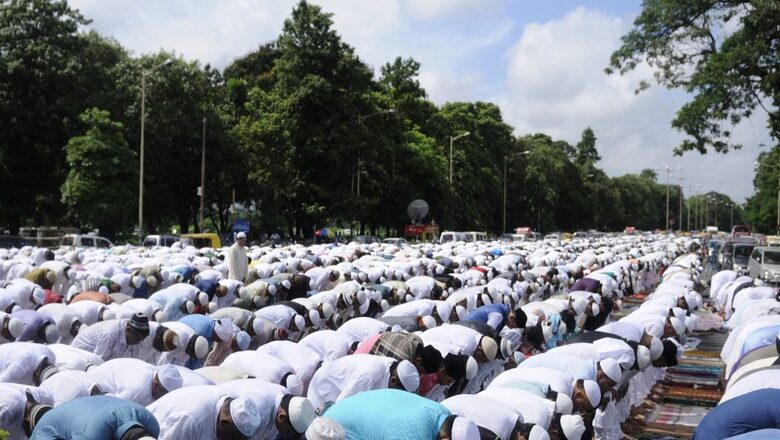
views
In this strange world driven by narratives, one narrative that has become a national mainstay and even internationalised to a great extent is that Muslims are unsafe in India, today. Interestingly, it all started with the victory of the Bharatiya Janata Party (BJP) in the 2014 elections and the 2019 elections after that. But now, no matter how hard the facts are that Muslims have emerged as the largest beneficiaries of the Modi government schemes, the sheer power of anecdotes overrules it. In such a scenario, one key fact that has been missed by all of us is how a section of Muslims is being disenfranchised systematically in our country by their co-religionists.
India is constitutionally a secular-liberal polity that provides freedom of religion for all, but the way Ahmadiyya, a particular sect of Islam, is being threatened with stripping off their religious identity by people of their own community has created an interesting paradox last week. In the southern state of Andhra Pradesh, the Ahmadiyya community has approached the Central government to intervene against a case of their exclusion from the larger Muslim community. This follows a resolution passed by the Andhra Pradesh Waqf Board in February declaring them as ‘Non-Muslims’ or ‘Kafirs’.
‘Kafir’ is a derogatory term that is often used by Muslims against those people, including Hindus, who don’t embrace Islam. The opposite of Kafir is Momin or someone who is a believer.
Ahmadiyya Muslims are a sub-sect of the Sunni Muslims who originated in the 19th century in undivided Punjab, India. Its founder was Mirza Ghulam Ahmad, a reformist who wanted Islam to adapt in tune with modern times and assume a more liberal tone and tenor. He stressed on the role of Islam as a matter of personal faith and took an apologetic stand against ‘jihad’ which is using violence to spread Islam or for political motives. The Ahmadiyya sect as founded by him became a key example of the reformist movement in the Indian subcontinent in the late 19th century, a time when even Hinduism was also witnessing revivalist and reformist movements of its own, including the Arya Samaj and the Brahmo Samaj movements. But ironically, unlike the Hindus who received the reformist movements positively, Ahmadiyyas have become a major irritant for orthodox Muslims across the world.
The worst example of their persecution is present in Pakistan which has outlawed them from claiming their Muslim identity. They don’t have a legal status in the country today and instances of their social persecution are just too many. In fact, Pakistan has also disowned the first person to ever win a Nobel Prize from the country for being a person from the Ahmadi community. Dr Abdus Salam, who won the Nobel Prize in Physics in 1979 died unrecognised, uncelebrated and outlawed in Pakistan where he was born in the undivided Punjab in 1926. Tragically, the term ‘Muslim’ has been painted white to hide this reference on his tomb in Pakistan, despite Dr Salam playing a huge role in setting up key institutions such as Pakistan Atomic Energy Commission, the Space and Upper Atmosphere Research Commission and the Karachi Nuclear Power Plant.
In India, Ahmadiyyas have enjoyed much more equal treatment and the right to be called a Muslim, all thanks to the legal status that is accorded to them under Indian Law. Many Ahmadis have risen to positions of prominence including the celebrated scientist, Dr Hafiz Saleh Muhammad Alladin who was awarded by the University Grants Commission (UGC) and served as an educational advisor to India’s ex-President, Dr APJ Abdul Kalam.
Although India continues to protect their rights becoming a curious exception in a world where they are persecuted through various means, socially, they still remain an ostracised community. They don’t have representation on the All India Muslim Personal Law Board even today. Not just this, their events are regularly called-off and stones are pelted by miscreants inside their mosque as a mark of protest against their reformatory zeal.
Some of them even recall how they were banned from using public taps or shopping at common shops meant for other sects of Muslims. This social boycott of the Ahmadi community makes the decision of the Andhra Waqf Board to call them Kafir as just another move to deny them their rights. It is not the first time though. In 2012 also, a similar resolution was passed in undivided Andhra, a matter which is still pending in the court.
India has been a cradle for multiple religions with its Constitution providing equal rights to each. In the same sentiment, the Modi government has also taken the Waqf board to task by telling them that no one has the authority to declare Ahmadiyyas as non-Muslims. But as always happens, this section of Muslims will still witness ostracisation socially, even as a fake narrative on India being intolerant towards its minorities will make global headlines.
The author is a PhD in International Relations from the Department of International Relations, South Asian University. Her research focuses on political economy of South Asia and regional integration. Views expressed in the above piece are personal and solely that of the author. They do not necessarily reflect News18’s views.




















Comments
0 comment